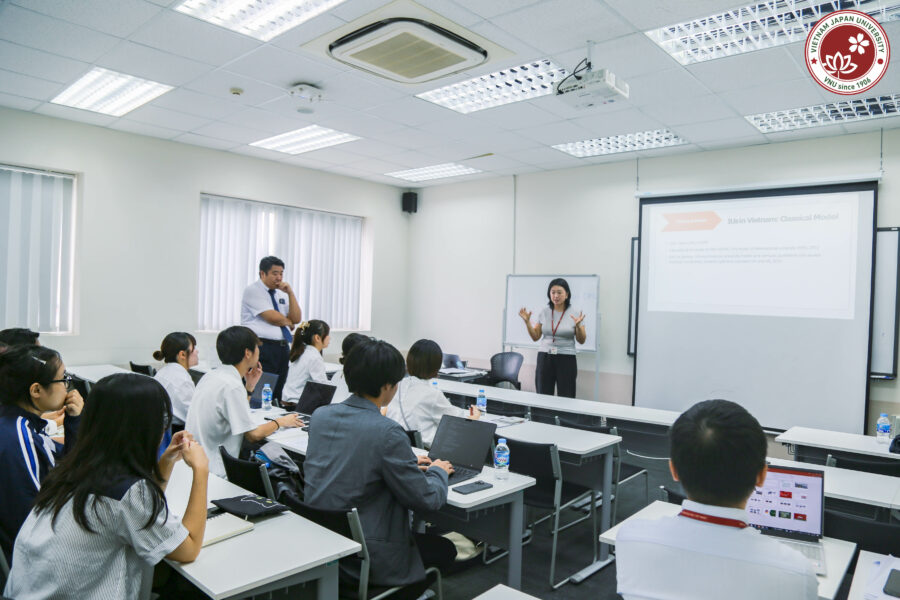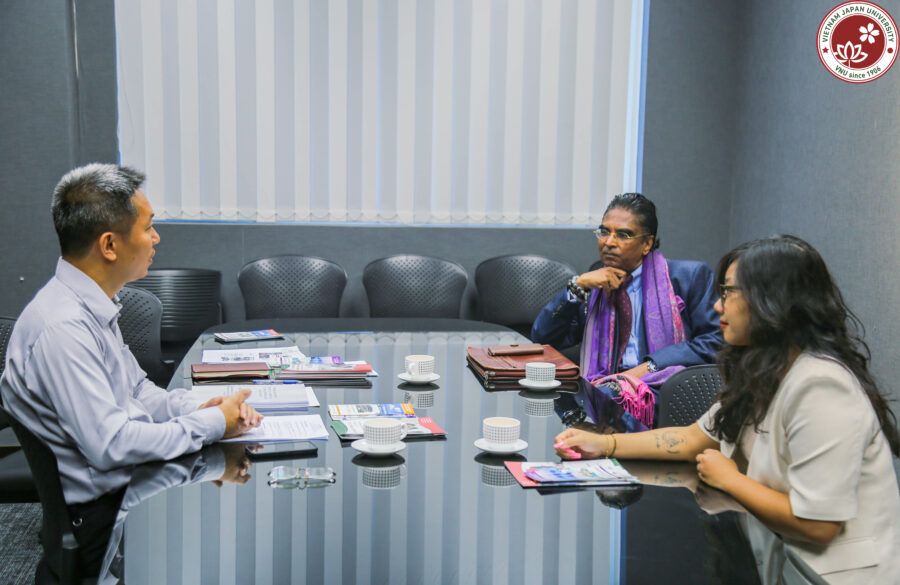From 23-26 August, students from Vietnam Japan University (VJU) and Kwansei Gakuin University (KGU) participated in an online joint leaning program, with 8 students from VJU’s Japanese language program and 21 students from KGU. The program had been planned by both universities for half a year, with the aim for students to engage in discussion about their countries’ environmental issues and their effects, as well as to deepen understandings about the environment and development.
On the first day of the program, KGU’s Professor Takada Hirohiko and VJU’s Dr Tran Thi Viet Ha, a lecturer presented lectures. Professor Takada introduced Japan’s history of environmental problems, and outlined the background related to the systems and social enterprises that led to solving these problems. Dr Ha presented on current issues in Vietnam related to management of lakes in Hanoi. In response to the specialist content, students from both countries diligently posted questions in English, based on their own knowledge and interest.
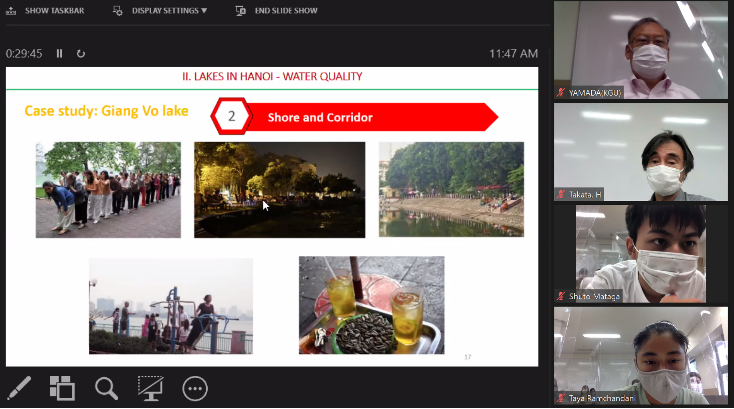
First day of the program: KGU students listen to a lecture from Dr Tran Thi Viet Ha
On the third day, there were presentations of 6 groups (4 from KGU and 2 from VJU) on the topic of ‘Introduction of cultures and lifestyles related to the environment’. VJU students presented on the Mid-Autumn Festival celebrating farming harvests, while KGU students presented on Japan’s four seasons and the World Heritage Site Yakushima, as well as environmental issues as explored in Studio Ghibli films. VJU students were somewhat surprised to hear that Japan’s Tsukimi Festival is not celebrated on the same scale as Vietnam’s Mid-Autumn Festival. Additionally, pollution caused by the discarding of plastic festival decorations in recent years was also discussed.
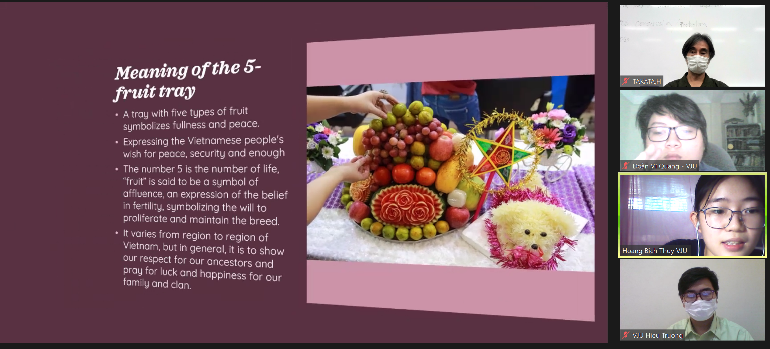
VJU students introduce Vietnam’s Mid-Autumn Festival (Day 3 of program)

KGU students introduce Studio Ghibli’s movies (Day 3 of program)
The final day of the program concluded with groups presenting the results of research programs they had been working on for 2 weeks. VJU students raised the issue of the pollution of lakes and rivers in Hanoi, while KGU students presented on the results of research into environmental protection activities and sustainable management systems in Lake Biwa, Saga Prefecture. With students’ feeling more comfortable on the 4th day of activities, there was a lively session of questions and answers. Students from both countries renewed their recognition of the importance of innovation in the thinking and actions of people protecting the environment, with VJU students potentially able to utilise environmental protection activities carried out by students in the Lake Biwa model when responding to issues in Hanoi’s lakes and rivers.

KGU students present on the results of research at Lake Biwa (Final day of program)
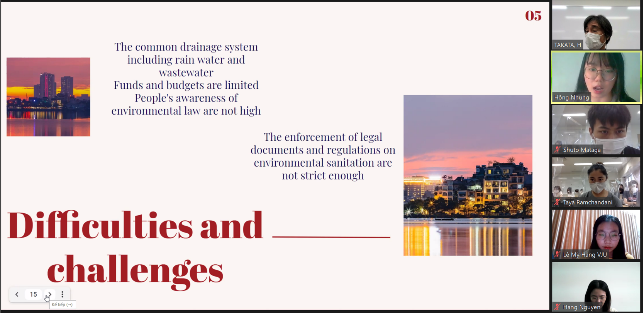
VJU students present on Hanoi’s environmental issues (Final day of program)
The program was a for-credit course for KGU students, who participated from their classroom in Japan. On the other hand, because of a lockdown in Hanoi, VJU students were forced to participate from their homes, which posed additional difficulties. Despite that, in addition to the chief moderator Prof. Takada, VJU’s Dr Dang Thanh Tu (R&DP Standing Deputy Chief), Mr Truong Cong Hieu (Student Affairs and Career Support Officer), and Dr Nguyen Thi Thuy Hang (Chief of Academics and Student Affairs Office, MCCD Lecturer), served as sub-moderators for (respectively) the first, third, and final day; not only actively encouraging the participation of students, but also providing detailed guidance in response to student presentations, contributing significantly to the success of the four-day program. Reflecting on the program, Dr Tu, who was coordinator for the VJU side, said: ‘This program went beyond the short-term cultural exchange program framework previously conducted by VJU, giving the opportunity for VJU students to learn many new things while presenting and researching academically in a field different to their major. I hope that VJU will be able to hold similar programs in the future for our students’.
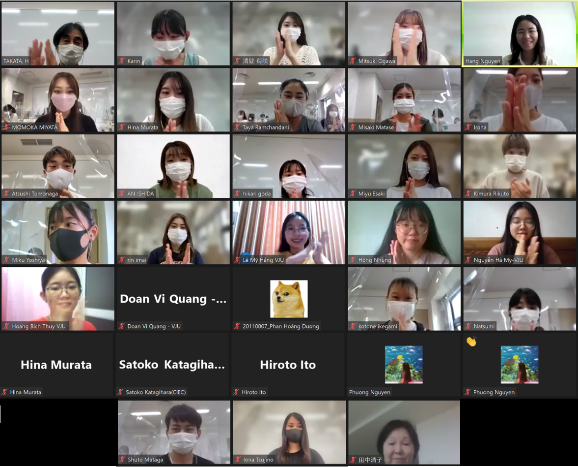
Pictures of participants (Final day of program)

